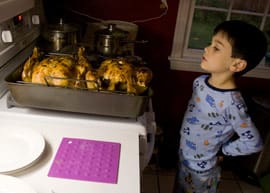Compulsory Cooking Lessons for 7-14 year olds?

After his calamitous attempt to introduce the English Baccalaureate Michael Gove has moved on to another ambitious educational reform: rolling out compulsory cooking lessons for children between the ages of 7 and 14 by September 2014. The main purpose of the plan is to help children learn how to cook properly and understand the nutritional value of food, in an effort to prevent the continual rise of childhood obesity. The idea has been met with a considerable amount of praise from the culinary community and education sector alike and is being seen as something that might finally make a difference to the future of the health of British children.
The idea of compulsory cooking lessons was suggest by Henry Dimbleby and John Vincent, founders of the Leon fast food chain, who were asked last year by Mr Gove to come up with ideas of how to move on the better school meals movement begun by Jamie Oliver in 2006. As well as compulsory cooking, the two restaurateurs suggested that pupils should be banned from bringing packed lunches and should be forced to eat on the school premises. Currently only 40% of pupils have school dinners (2013, Daily Mail), so this plan could be very difficult to implement if the suggestion is taken seriously.
Widespread support
A variety of different celebrities are on board with the idea of compulsory cooking classes in schools, including musician turned chef Levi Roots, who has been travelling around the country speaking to pupils about the importance of cooking. When asked about the plans by the BBC, Mr Roots said this.
“For me cooking and music go hand-in-hand and too many youngsters see them as dull or laborious subjects, which is far from the truth…My hopes for the tour this year are to get young people excited about cooking and music, but also to prove to them that it doesn’t matter where you come from or what your background is, if you work hard and stay determined you can be a success”.
The proposals have gained support from many healthy eating campaigners and organisations, including Ella’s Kitchen, a company that sells organic baby food and promotes healthy eating for children. Paul Lindley, the company’s founder, recently released a report called Averting a Recipe for Disaster, Our Children and Their Food which claims that over half of teachers think that the government isn’t doing enough to promote healthy eating in schools. Mr Lindley is supported by TV chef Hugh Fearnley-Whittingstall and Olympic rower Tom Aiken, as well as a number of other big names, and is currently running a petition from his site that asks the government to commit to a ‘Food Manifesto for the Under-5s’ that will help children to have a positive relationship with food from a younger age.
Before students complete their cooking lessons at 14 the government aims to have taught how to make at least 20 dishes. They are listed below (taken from the Telegraph).
Cottage pie – uses up leftovers, comforts like lamb’s wool
Dal – spiced pulses, incredibly cheap and phenomenally healthy
Tomato sauce – versatile, can be used in at least 10 other dishes
Paella – beautiful, energising and aromatic
Omelette – quite simply essential
Chicken stock – made from roast leftovers; boosts flavour without salt
Pasta and bean soup – rib sticking yet oddly elegant
Cornish pasties – easier-than-you-think portable goodness
Pancakes – a novice chef’s first challenge; always delectable
Mussels “marinières” – sustainably farmed seafood, economical and easy
French mustard vinaigrette – eye-watering, transforming
Beef stew – wine-rich and with a strip of orange rind (and dumplings)
Vegetable gratin – heart-warming use of béchamel and melted cheese
Fish pie – rich, popular party food
Bread – a life-long lasting lesson in fermentation
Grilled fish with hollandaise – challenging and ultimately impressive
Mayonnaise – merits the elbow grease and universally versatile
Curry – any one is a master class in balancing diverse flavour
Mashed potato – whipped with butter, velvety smooth
Lancashire hot pot – the easiest stew of all, beloved
The government seem committed to bringing about these changes and as 70% of teachers said to support the decision (Ella’s Kitchen, 2013) it seems to be the right move for everyone. A spokesperson for the Department of Education had this to say to the Telegraph about the proposition:
“Given the obesity issues that face our children today, it is vital that they know as much as possible about healthy eating and what constitutes a balanced diet. It’s also important that they can develop an interest and understanding of good food. By bringing this into the curriculum, we want to encourage children to develop a love of food and cooking that will stay with them as they grow up.”
This policy does seem to have a huge amount of popular support and it does seem to be one of Mr Gove’s better ideas. It will teach the next generation about the importance of healthy eating and hopefully help combat the sharp rise in childhood obesity that we are currently seeing. I also think that it’s something that children could really enjoy and could be a lot of fun in the classroom. You only have to look at the popularity of programmes such as Masterchef to see that there is a genuine interest in cooking in the UK and I think that tapping in to this interest in schools could be really rewarding and could make for very engaging learning experiences. My only concern would be the lack of trained cookery teachers currently working in schools. If this could be addressed then I think this initiative has the potential to make a very positive impact and help children develop a love of cooking which will stay with them for the rest of their lives.
Popular Teaching Resources
Stay Up To Date
Sign up for our newsletter and we’ll let you know when we create new early years resources.





